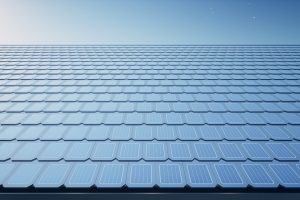
Solar roofing has emerged as a viable option for businesses looking to reduce their environmental footprint while simultaneously cutting costs on energy expenses. In Texas, where the sun shines for most of the year, using this abundant resource through solar roofing can have a profound impact on businesses.
We’ll explore how incorporating solar roofing technology can benefit your business, from reducing operational expenses to enhancing your company’s reputation as an environmentally responsible entity.
The Economic Impact of Solar Installation
The economic impact of solar installation is multifaceted, offering both immediate and long-term financial benefits. Initially, the upfront cost of solar panels is offset by reduced utility bills as solar energy replaces a significant portion of your electricity consumption. Over time, this translates into substantial savings, particularly as energy prices fluctuate.
Beyond direct savings, solar installations can enhance a business’s brand value by showcasing a commitment to sustainability, attracting customers who prioritize environmental responsibility. This can lead to increased customer loyalty and potentially higher sales. Solar panels can increase the property value of commercial buildings, offering an attractive return on investment when the property is sold.
Companies that adopt solar technology often find themselves at the forefront of energy independence, reducing their reliance on traditional power sources and insulating themselves from energy market volatility.
The Environmental Benefits of Going Solar
The environmental benefits of going solar are clear and compelling. Solar energy is a clean, renewable resource that reduces reliance on fossil fuels, which are the primary source of greenhouse gas emissions.
Solar panels have a relatively low environmental impact compared to other energy sources. They operate silently, produce no waste or emissions during their lifespan, and can be recycled at the end of their useful life. This makes them an ideal choice for businesses looking to minimize their ecological footprint.
Solar installations can also reduce water usage. Traditional power generation methods, such as coal or natural gas, require significant amounts of water for cooling. Solar panels, on the other hand, use photovoltaic technology that requires no water, preserving another vital resource.
Solar energy can contribute to biodiversity conservation. By reducing the need for new power plants, which often require large tracts of land and can disrupt wildlife habitats, solar panels can be installed on existing structures, like rooftops, making them a space-efficient and environmentally friendly option.
Calculating the Long-Term Savings
The ROI of solar roofing involves considering both the costs and benefits over the system’s lifetime. The initial costs include the price of the solar panels, installation, and any necessary upgrades to the roofing structure. However, these costs are mitigated by the long-term savings on energy bills, as solar panels generate free electricity once installed.
The savings on energy bills are just the beginning. Solar panels typically have a lifespan of 25 to 30 years, meaning they can provide decades of energy production. During this time, the cost of traditional electricity is likely to rise, increasing the value of the energy produced by solar panels.
Tax incentives and rebates can further improve the ROI of solar roofing. Many governments offer financial incentives to encourage the adoption of solar energy, which can cover a significant portion of the initial installation costs. Solar panels can also increase the resale value of a property, providing an additional financial benefit if the property is sold.
Tailoring to Your Business Needs
Custom solar solutions are essential for maximizing the benefits of solar roofing. Every business has unique energy needs, and a one-size-fits-all approach is rarely effective. Custom solutions involve assessing the specific energy consumption patterns, roof architecture, and financial objectives of a business to design a solar system that meets those needs.
The design process for custom solar solutions considers factors such as the roof’s orientation and angle, local weather patterns, and any shading from nearby structures. This ensures that the solar panels are positioned for optimal energy production. Businesses can choose from a variety of solar panel types and technologies to find the best fit for their budget and energy goals.
The installation process for custom solar solutions is carefully managed to minimize disruption to the business. Professional roofers work to ensure that the installation is completed efficiently and safely, with attention to detail that guarantees the system’s performance and longevity.
What to Expect When Going Solar
The journey to solar roofing begins with a thorough assessment of your business’s needs and the suitability of your premises for solar panel installation. A roofer will evaluate factors such as roof condition, orientation, and shading. Once the assessment is complete, you’ll receive a detailed proposal outlining the system design, cost, and projected energy savings.
The next step is the installation process, which is typically quick and causes minimal disruption to your daily operations. Installers will mount the solar panels, connect them to an inverter, and integrate the system with your building’s electrical infrastructure. Throughout the installation, safety and quality standards are paramount to ensure the system’s reliability and efficiency.
After installation, the system undergoes testing and commissioning to ensure everything is functioning correctly. This includes verifying the electrical connections and the performance of the solar panels under various conditions. Once commissioned, your solar roofing system is ready to start generating clean, renewable energy for your business.
Post-installation, you can expect ongoing support from your solar provider. This includes monitoring system performance, maintenance services, and assistance with any operational questions you may have. With a team behind you, transitioning to solar energy can be a smooth and rewarding experience.
The Texas Incentives For Solar Roofing
Texas offers a range of incentives to encourage businesses and homeowners to adopt solar energy. These incentives can significantly reduce the cost of solar installation and improve the ROI. The state provides rebates that directly lower the upfront cost, making solar more accessible to a broader audience.
There are property tax exemptions for the added value that solar panels bring to a property. This means you can improve your property’s value without increasing your property taxes. The federal government also offers a tax credit, which allows you to deduct a percentage of the solar system’s cost from your federal taxes.
Local utilities in Texas may offer their own incentives, such as buyback programs for excess energy generated by your solar panels. It’s essential to research and take advantage of these programs to maximize your savings. Texas’ net metering policies allow for credit on utility bills for the surplus energy that your solar system feeds back into the grid.
Investing in the Future with Solar Roofing
Investing in solar roofing is an investment in the future of your business and the planet. It’s a step towards energy independence, reducing reliance on non-renewable resources and contributing to a more sustainable energy landscape. The economic benefits, combined with the environmental impact, make solar roofing a compelling choice for any forward-thinking business.
Solar solutions become more efficient and cost-effective. This trend is likely to continue, making solar energy an increasingly attractive option. Solar roofing offers a unique opportunity to reduce operating costs, enhance your brand, and contribute to environmental conservation. With the available incentives and the long-term savings, there has never been a better time to consider solar roofing for your business.
from: https://mydividedsky.com/10983-2/


No comments:
Post a Comment